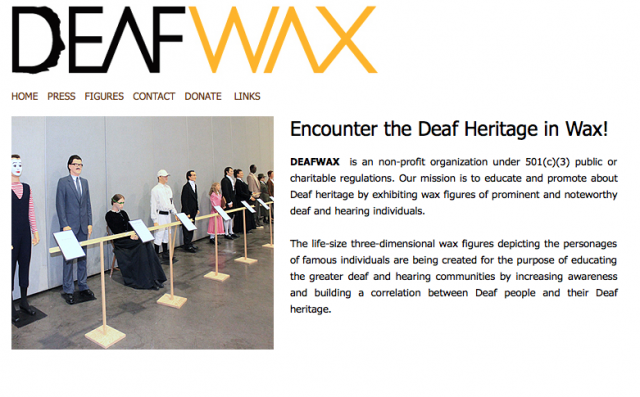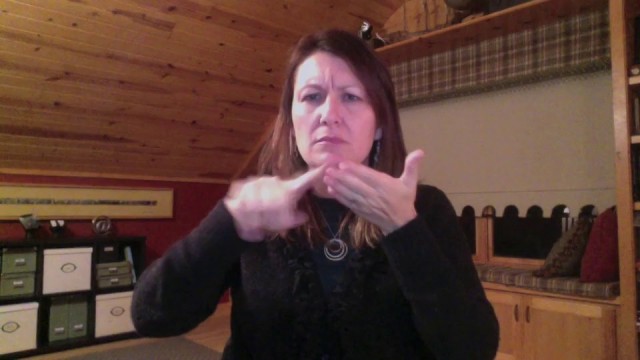Originally appeared in Silent News, February 2002.
I have a little secret to tell you.
I am a ballet failure.
But, ah, I quit ballet for a reason. You see, Sesame Street was on at 5 p.m. daily – the same time as my ballet lessons. So I was given the opportunity to pick one or the other.
My mother’s stern face looked at me with raised eyebrows as she asked me what I wanted to do, and I said happily, “OK! QUIT!” I saw the hope in her face crumbling away. Mom had grown up taking ballet lessons and had often shown me pictures of her dancing on toe in sequined leotards.
But me? In a tutu? Me, a tomboy that preferred to kick a soccer ball into the faces of boys who aimed for my knees during practice (I’ve got the scars on my legs to prove it)? Seeing Linda Bove on Sesame Street was the greatest highlight of my day when I came home from school. Especially since the show had started being captioned – I could now finally tell my friends who my favorite characters were. To this day it’s Telly and the monsters that communicate by honking their noses.
I remember my father trying to make my mom – who can speak well – lipread entire conversations on TV, getting annoyed with her when she would sign, “Hold on, hold on” with her eyes fixated on the people’s mouths. And I would watch diligently along with Dad, trying to learn what I could.
Captioning wasn’t without its drawbacks for my parents, though. One evening, I saw the sentence on the big 27-inch television: “JACK, I’M NOT A VIRGIN.” Mom was in another room, so I asked Dad, “What’s a virgin?” My dad stammered, and after a long pause, said a little too quickly, “Someone who’s never been kissed!”
Later that night, as Mom was giving me my bath, I proudly said that I was not a virgin. After picking up the bar of soap that suddenly slipped out of her hands, Mom asked me in shaky signs, “Trudy, what does virgin mean?” I gleefully announced that I had been kissed, and therefore not a virgin!
She immediately went to give my father a lesson in telling the truth after teaching me about the birds and bees.
These all are, of course, because of the advent of closed captioning early in my life. I grew up with access to television, though I definitely remember the days before captioning (and because I am a night person by nature, I often have to flip through channels repeatedly until I can find something captioned at three or four a.m., usually Law & Order reruns).
I was fortunate to have parents who were fluent in my language, so I always had communication access 24 hours a day, 7 days a week; I had this even with my hearing family members, who always had paper and pen ready to communicate with me if they didn’t know the signs. Even so, there’s nothing like a movie that the entire family can watch together.
At the public junior high school I attended along with 50 other deaf children, the deaf kids in my crowd and I would always bring the newspaper’s television guide to school. At lunchtime or during classes together, we would all agree to watch whatever movie of the week that night. The next day we would gather to discuss the movie, its characters and plot, and determine our opinions on the movie’s results.
An early movie club, I guess. And these ‘discussions’ were only made possible through the movies being captioned. I remember learning what domestic violence was when my mother and I watched Farrah Fawcett in The Burning Bed. It was the first time I understood the powerlessness of women in some relationships – and their choices – and it’s served me well throughout life. In high school, I was able to keep up with current events, thanks to closed captioning. My two-hour humanities course during my senior year required that we keep a log of television news broadcasts during the Gulf War. I wouldn’t have been able to do that if not for closed captioning.
I believe we’ve got a long way to go. I’m guilty of sometimes accepting too quickly that a show isn’t captioned, and wondering if it’s ever going to be (or suddenly stop being captioned, like many of the shows on The Learning Channel, such as Trading Spaces). All I have to do is write letters, and draw attention to the fact. It takes time and commitment, but if we all collectively write letters – polite, clear letters – we’d probably make more of an impact.
I would still choose Oscar the Grouch over a showing of The Nutcracker on television any day.
Copyrighted material. This article can not be copied, reproduced, or redistributed without the written consent of the author.


